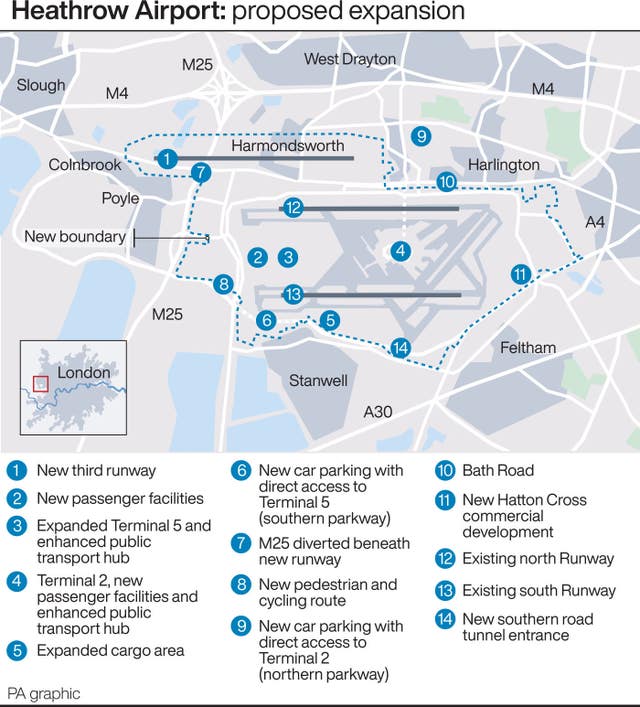
Heathrow expansion has been a controversial project for more than a decade.
Here, the PA news agency answers the key questions around the scheme and the legal challenge:
– Who originally brought the legal challenge to court?
A group of councils in London affected by the potential addition of a third runway, as well as environmental charities and London Mayor Sadiq Khan.
– What was their argument?
They claimed the Government’s decision to support Heathrow expansion was incompatible with the UK’s climate change commitments
– Why has the case come before the Supreme Court?
Back in February, the campaigners won a Court of Appeal ruling on environmental grounds, with three leading judges concluding former transport secretary Chris Grayling failed to take account of the Government’s commitments to tackling climate change when setting out support for the project in an Airports National Policy Statement (ANPS).
They ruled the ANPS was unlawful because Mr Grayling failed to take account of the Government’s commitment to the Paris Agreement – which commits signatories to tackling climate change by taking measures to limit global warming to well below 2C.

Heathrow appealed against the judgment, taking it to the Supreme Court – the highest court in the UK.
– What has the Supreme Court ruled?
The Supreme Court has ruled in Heathrow’s favour, finding the Government’s decision was lawful.
It concluded Mr Grayling’s decision was lawful, he did take the Paris Agreement into account and he was “not legally required to give it more weight than he decided was appropriate” in line with the advice of the Committee on Climate Change.
The ANPS is “valid”, the court said.
– Will the expansion definitely now go ahead?
The latest ruling clears a hurdle for Heathrow, but there are still many more in the way.
Heathrow statement on the unanimous Supreme Court decision today, relating to expansion, ruling the UK Govt. Airports National Policy Statement (ANPS) is lawful and legal Government policy. pic.twitter.com/JDQh8GInII
— yourHeathrow (@yourHeathrow) December 16, 2020
Any planning decisions on the project in future will have to take into account the Government’s commitments to addressing climate change, including the UK’s net-zero by 2050 target.
There could be further legal challenges – for example, campaigners have mooted the possibility of launching proceedings at the European Court of Human Rights.
In addition, the coronavirus pandemic has hit the aviation industry, including airports like Heathrow, hard, which could affect plans for the future.
– Is the impact on climate change the only reason some people are opposed to expansion?
No, there is a long list of other concerns such as air quality, noise and potentially higher fares.
– What is Boris Johnson’s position?
When he was London mayor he famously promised to “lie down… in front of those bulldozers” to stop the runway being built.
He has expressed a more ambiguous stance since becoming Prime Minister, although some believe he will use the decision of the court to scrap the project.
– Why does Heathrow want to expand?
The airport says its two runways are full and have been operating at 98% capacity for more than a decade.
This is a setback, not the end. Please add your name to our petition calling on the Prime Minister to put an end to Heathrow expansion once and for all 👉https://t.co/xT205EUGvO #NoThirdRunway #Heathrow pic.twitter.com/iOgNzXJM17
— Friends of the Earth (@friends_earth) December 16, 2020
– Wasn’t the third runway agreed years ago?
Gordon Brown’s Labour government gave the project the go-ahead in 2009, but it was scrapped by the subsequent coalition government of the Conservatives and Liberal Democrats in May 2010.
– What are the arguments in favour of a third runway?
Business groups claim it is vital for regional connectivity and access to markets around the world.
Heathrow says if it does not expand then it will be overtaken by rival airports such as Charles de Gaulle in Paris.
– How much would a third runway cost?
The airport’s latest estimate is £14 billion.
– Who would pay?
Expansion would be paid for by the airport, but ultimately much of the money would come from passengers through fees levied on airlines.


Comments: Our rules
We want our comments to be a lively and valuable part of our community - a place where readers can debate and engage with the most important local issues. The ability to comment on our stories is a privilege, not a right, however, and that privilege may be withdrawn if it is abused or misused.
Please report any comments that break our rules.
Read the rules hereComments are closed on this article